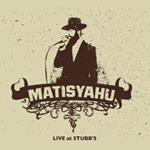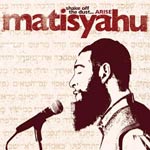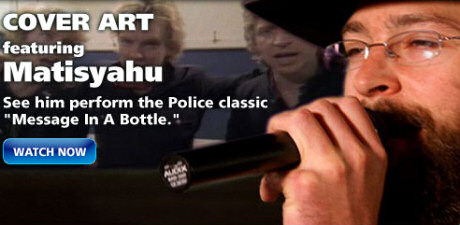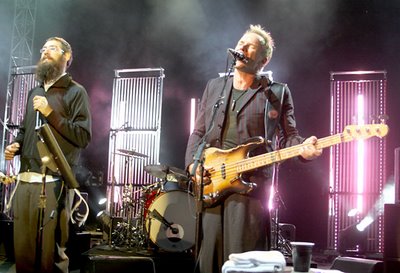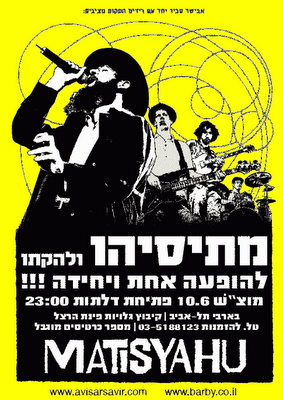Hasieeed!He turned down dinner with Madonna and has turned his back on the other temptations of the music business. It's a tough life when you're the world's first Hasidic reggae star. On his home turf in Brooklyn, Gaby Wood meets Matisyahu Sunday May 21, 2006
 | 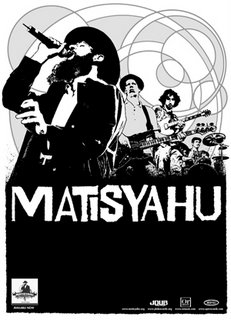
'Pretty freaking spiritual' ... Matisyahu
|
The night before I meet Matisyahu, the world's first Hasidic reggae star, there is a riot in a nearby Hasidic neighbourhood in Brooklyn. It makes the front page of all the New York papers: police arrested a 75-year-old Jewish man for talking on his mobile while driving, and hundreds of Orthodox Jews took to the streets in retaliation. Bonfires were lit, a police car was set on fire, and the crowd began to chant: 'No justice no peace!'
That there were echoes of Bob Marley in this impromptu Jewish protest song would not have been lost on Americans newly familiar with the merging of the two cultures. Matisyahu, the unlikely phenomenon responsible for bringing them together in mainstream music, has sold well over a million copies of his first studio album, Youth, since it came out in the US in January.
Described by Rolling Stone magazine as 'the strangest thing to climb the Billboard charts this year', Matisyahu sounds at first like something the Farrelly brothers might have invented had they teamed up with Sacha Baron Cohen: a rapping, reggae-inspired, bearded, schul-going Orthodox pop star, who sings in Jamaican patois of 'Hashem's rays' and waiting for the 'Mashiach'. Let's face it, how many other reggae CDs credit several rabbis in the sleeve notes?
Yet it became clear almost immediately that Matisyahu was more than just a gimmick. Made after a successful recent live album and a quieter release, Shake off the Dust ... Arise from 2004, Youth was produced by Bill Laswell, the man behind artists as varied as Herbie Hancock, Laurie Anderson, Motörhead and Bob Marley. It debuted at number two in the Billboard charts, is still in the top 20 several months later, and has already spawned so many imitators that there are websites devoted to 'top 10 Jewish reggae' bands. Matisyahu's lyrics are full of expressions of faith and torment that might as well be universal, and the vibrant sound is perhaps best described as Bob Marley without the sunshine. Matisyahu, who begins his first UK tour this month, says he has seen 'every type of person' at his concerts: 'people you'd normally see at a hip hop show, people who look like indie rock people, then some middle-aged lady and some older men with a beard and a yarmulke. That's what's working for us - people appreciate the music and they appreciate the whole story and the vibe behind it.'
The man himself is a towering 27-year-old. Matisyahu - born Matthew Miller - is 6' 5" and so softly spoken, I can barely hear him over the Flaming Lips album he's playing in the background. He wears a crisp blue shirt over dark trousers, a prayer belt and trainers; as he speaks, with a shy sort of honesty, he contorts his long legs around each other and pushes his yarmulke back on his head.
He has asked to meet at the youth centre in Crown Heights, a part of Brooklyn that consists (almost too perfectly, given Matisyahu's music) of a strong Hasidic enclave surrounded by a mostly West Indian population. He lives here with his wife and eight-month-old son, partly because 'being religious you have to pray three times a day, and there's synagogue on every block', and partly because he likes the 'vibe of togetherness'.
His best friend, Elon Weinberg, works at the youth centre - a large, fluorescent-lit room empty except for a couple of old leather sofas - and the place was the venue of one of the band's very first concerts, about three years ago. Matisyahu, pointing to the far end of the room, says: 'We were playing in that corner, and in the middle of the gig, these maggots started falling, like, all over the place. We didn't even realise what they were. We were looking around, the drummer was looking at his drums, and he sees these white things and he's like, what is this? And suddenly he stops in the middle of the gig and screams. And I looked up and there were maggots falling out of the ceiling.'
You can't, I suggest, get much more biblical than that.
Hasidism, with its many rules and restrictions, would seem to be one of the most difficult things to align with a life in the music business, one of the most unruly careers you could find. There are the practicalities, for a start - not being allowed to shake a woman's hand unless you are married to her, still less receive the random physical adulation of female fans; finding kosher food on the road; being told by your rabbi that the stage-diving has got to stop. And then there are the philosophical discrepancies, which were highlighted recently as Matisyahu's celebrity clashed with his religion.
Earlier this year, Madonna sent word that she'd like to invite him to her Seder dinner at Passover. However, Madonna, by virtue of being herself, goes against Matisyahu's beliefs: according to Hasidic Judaism, women are not allowed to sing in public. ('Um, yeah,' he confirms uncomfortably, 'it's something that we wouldn't really support.') He didn't go to the Seder, needless to say, and seems embarrassed when the subject is mentioned.
His friend Elon thinks that if anyone can handle the combination of lifestyles, it's Matisyahu. 'Is he under pressure? Sure,' Weinberg tells me. 'Just to operate within these worlds - he's already changed his phone number, changed his email. Everyone wants a piece of the action. But he's a very refined, spiritual person by nature.'
What do people in the community think of what he's doing? 'There are opinions,' says Weinberg, diplomatically. 'There's no question that the young people love it, and the returnees to Judaism - the people who didn't grow up in this environment - they love it. A lot of people think that he's bringing a godly message to the world. But others feel he's misrepresenting Judaism, that it's not necessarily kosher. I think the main premise those people subscribe to is that he's playing a style of music that's not traditionally Jewish, and that he's going into environments that are not modest, that are full of sex and drugs.'
Odd as it may seem, Matisyahu's journey to the regulated world in which he now lives is in many ways an old-fashioned tale of rock'n'roll rebellion. He grew up in White Plains, a middle-class suburb of New York. His parents, both liberal, secular Jews, are social workers who took him to his first Grateful Dead concert before he was two. He hated Hebrew school as a boy, and felt a misfit altogether. By 14, he was a full-blown hippie, wearing dreadlocks, playing the bongos in his lunch hour and listening to a lot of Bob Marley, whose references to the Old Testament struck him. He visited Israel for the first time the summer he turned 16, and began to feel a connection to his Jewish identity he'd never felt before. On his return home, he dropped out of high school to follow Phish on a US tour, and slept rough for a while. One friend remembers him as 'a total stoner' - a habit that got him deposited in a progressive school in Oregon, where he delved further into music, beatboxing in local cafés under the name of MC Truth.
'It was wild,' he remembered recently, 'We would drink a big pitcher of mushroom tea, and I'd come out with a turban and a huge Israeli flag, and we'd walk around throwing sage on people.'
Two years later, he came back to New York, and began to frequent a synagogue on the Upper West Side founded by Shlomo Carlebach, a man famous for his music, and whose pronounced style he has since incorporated into his own music. 'All the prayers are like these melodies,' Matisyahu says, 'they're very simple and just sort of soulful - not like the typical Jewish liturgy, not operatic. They're almost folky, but they feel Jewish.'
It was around this time that Matisyahu happened to meet a rabbi in Washington Square Park. 'He had been on a similar path to me,' he says, 'he was on Grateful Dead tours and stuff like that. You usually think of a Hasidic person as being really unrelatable - like, not funny, certainly, and this guy immediately broke all of those stereotypes.'
By this time, Matisyahu was 'sort of becoming religious': he had stopped shaving, was praying once or twice a day, and when he tried wearing a yarmulke in the street, he liked it - 'I liked representing myself through my roots and my culture. But I hadn't really done any learning.' That, he says, came a lot later. It was due to the influence of Rabbi Korn, the campus rabbi at New York University, that Matisyahu became religious in this particular way. 'Certainly until that point I didn't think of myself like, "I'm going to be a Hasidic Jew,"' he says, 'but I was with the rabbi in Washington Square Park, and the Hasidic Jews that he had there, one of them was actually from the same town where I grew up and went to the same Hebrew school, and another also came from a secular background. There's one night when you dance with the Torah, you take it outside into the street and you drink a lot. So while we were all drunk and dancing around the park with the Torah, I looked around and I thought, well, you know - like, this is not so far off.'
Matisyahu's parents panicked. 'I hadn't been living at home for a while,' he explains, 'and it just so happened that at the time when I was becoming religious, I moved home. It was just something that was scary because - it makes sense - you know, your kid is doing something that's totally foreign to what you know. So there's fear there. That's what happened with my parents.'
Instead, Matisyahu moved in with Rabbi Korn and his family. He lived there for six months, changed his name to the Hebrew version of Matthew, and entered the yeshiva [school for Torah study] again. 'A lot of times people say it's like a seed being planted in the ground and the seed rots, and from that comes a flower. That's sort of what happened to me - I was planted in yeshiva and what came out was me now - with a wife and a kid and a career.'
'I believe/Out of darkness comes light,' Matisyahu sings on the bouncy single 'King Without a Crown', 'Twilight unto the heights/Crown Heights burning' up all through the twilight/Said, thank you to my God, now I finally got it right'.
Matisyahu met his wife Tali when she was a film student at NYU. She asked to interview him for a documentary about the idea of men and women not touching. 'She was not as religious as I was. And she met me and saw after the interview that I'm like, very religious but very normal also. I think that's part of what attracted her.'
He was living in Crown Heights by then, and had started to work on his music full-time. 'Basically,' as he puts it, 'I was ready to get married. The way it kind of works is, you go to yeshiva for a certain period of time, and you know, you're not dating, you're not hanging out with girls, and that part of the human being, like, obviously needs at some point to express itself. So I talked to my rabbis, and they were saying that being in the circumstances that I was in, there could be lots of temptation. So they were, like, you should probably get married now, and you should find someone who will help you in serving God.'
They were set up by Rabbi Korn ('You have to set up a date through the rabbi') and went through a dating process that Matisyahu admits would make a great premise for a sitcom. 'After the date she called the rabbi and told him what happened, and I called the rabbi and told him what happened. Then we decided if we wanted to go another date. By the third date, I knew this was the person I wanted to marry.'
They were married within months; the couple's son, Laivy (so spelled so that no one pronounces the biblical figure like the brand of jeans), comes with the band when they tour the US - he is said to hang out backstage, wearing huge noise-cancelling headphones. Matisyahu thinks Laivy is going to be introduced to such a mixture of different lifestyles that he imagines his son's future to be 'totally different from anyone in the history of the world, probably'.
Matisyahu doesn't separate his beliefs from his music. 'It's all sort of united,' he says. The Jamaican patois he sings in was what came naturally to him after years of being influenced by reggae, and he found that the Rastafarian idea of Zion shared a good deal with what he had in mind. On the first track of Youth, 'Fire of Heaven', he sings, in haunting reverberation, 'Fire descends from on high in the shape of a lion/Burn the sacrifice of pride and ride on Mount Zion.' (He describes the dub reggae of this recording as 'like techno, but more spacey'.)
'There are definitely a lot of similarities,' he explains. 'The whole concept of transcendence and spiritual freedom - like Marley's "Redemption Song". "Emancipate yourselves from mental slavery/None but ourselves can free our minds" - that idea is very prevalent in my music. And "Running Away" is another one - "You must have done something wrong/Why can't you find the place where you belong?" Those concepts are really universal - every individual could relate to those themes. I draw on them from a Jewish context, because a lot of those themes are prevalent in Judaism, so through my learning and studying and my meditating, I draw my lyrics.'
I wonder if, after all the marketing and the success, he resents his religion being used for publicity purposes - whether being reduced to a mere one-line pitch debases everything he has worked towards in private. 'Well, no,' he says, considering the achievement more important. 'Because there has never been an Orthodox Jew in mainstream music. It's true, it's right here,' he adds, patting his chest, 'people can't really get away from that.'
There is a Lenny Bruce skit that goes: 'Dig: I'm Jewish. Count Basie's Jewish. Ray Charles is Jewish ... Negroes are all Jews, Italians are all Jews. Irishmen who have rejected their religion are Jews ... If you live in New York or any big city, you are Jewish'. By that reckoning, Matisyahu has nothing to fear: he is preaching to the converted.
